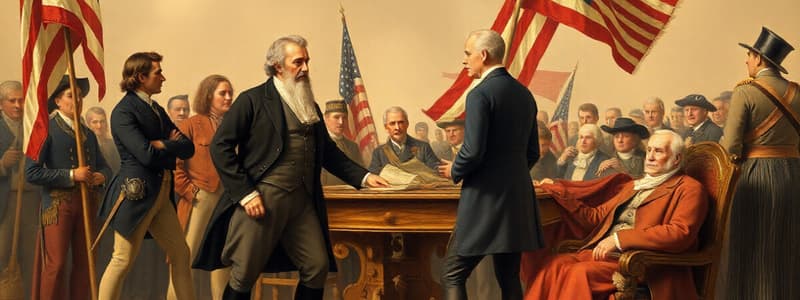Podcast
Questions and Answers
What were the main features of the Democratic Revolution?
What were the main features of the Democratic Revolution?
A shift towards popular politics, decline of notable leaders, and the rise of party politics.
What role did Andrew Jackson play in the Democratic Revolution?
What role did Andrew Jackson play in the Democratic Revolution?
He championed the principles of popular democracy and party politics, embodying the new political culture.
What was the prevailing ideology before the Democratic Revolution?
What was the prevailing ideology before the Democratic Revolution?
- Totalitarianism
- Republicanism (correct)
- Democracy
- Monarchy
Most citizens were eager to elect their intellectual superiors during the Democratic Revolution.
Most citizens were eager to elect their intellectual superiors during the Democratic Revolution.
Who declared that 'the majority should govern' as a maxim in free governments?
Who declared that 'the majority should govern' as a maxim in free governments?
The individuals who commonly sought public office in the Democratic Revolution were often described as '______ politicians.'
The individuals who commonly sought public office in the Democratic Revolution were often described as '______ politicians.'
In what years did the Jacksonian Presidency occur?
In what years did the Jacksonian Presidency occur?
Flashcards are hidden until you start studying
Study Notes
European Views on American Politics
- European visitors in the 1830s criticized American political parties and politicians, perceiving them as self-serving and lacking in intellectual depth.
- Frances Trollope, in "Domestic Manners of the Americans" (1832), described American politicians as preoccupied with trivial matters and engaging in unsavory behavior.
- Harriet Martineau found the level of political discourse shallow and the arguments advanced by politicians lacking in substance.
- Basil Hall was similarly unimpressed by the competence of New York assembly members.
- Alexis de Tocqueville, in "Democracy in America" (1835), attributed the low standard of American politics to the nature of democracy itself, suggesting that ordinary citizens lacked interest in important policy issues and were prone to the influence of charismatic but untrustworthy leaders.
The American Democratic Revolution
- Before 1815, American political leadership was dominated by men of ability and intellect who favored a republican system of governance based on "men of TALENTS and VIRTUE."
- These republican leaders, fearing the potential excesses of popular rule, designed governmental structures featuring Bills of Rights, bicameral legislatures, and independent judiciaries to limit the power of the masses.
- By the 1820s and 1830s, a shift occurred with the rise of democracy and party politics, characterized by ambitious politicians who actively sought office and mobilized support through newspapers, public events, and campaigns.
- Politics became a competitive contest for the votes of ordinary Americans, with politicians catering to their preferences and prejudices.
- Martin Van Buren, a prominent figure of this new breed of professional politician, championed the principle of majority rule.
- The emergence of party politics and the active participation of ordinary Americans in the electoral process redefined the meaning of democratic government.
The Politics of Democracy
- Aspiring candidates took their campaigns directly to voters, both in rural areas and larger towns, engaging in stump speeches and other forms of public outreach.
- The rise of democracy and party politics led to a shift in the landscape of American politics, with ordinary citizens having a greater voice in government and politicians responding to their desires.
Studying That Suits You
Use AI to generate personalized quizzes and flashcards to suit your learning preferences.




